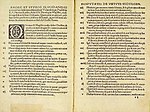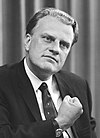福音主義
表示
| プロテスタント |
|---|
 |
| 改革 |
| 歴史 |
| 文化 |
| 宗教改革前 |
| 宗教改革時代 |
| 宗教改革時代後 |
| 超教派・その他 |
福音主義︵ふくいんしゅぎ、英語: Evangelicalism︶とは、福音主義キリスト教、または福音主義プロテスタントは、プロテスタントキリスト教における世界的な宗派を超えた運動であり、福音の本質は、イエスの贖罪を信じることによる恵みのみによる救いという教義であるという信念を持っている[1] [2] [3]。福音主義者は、救いを得るためには改心や﹁新生﹂の経験が重要であること、神が人類に啓示したものとしての聖書の権威、そしてキリスト教のメッセージを広めることを信じている。この運動は、19世紀、20世紀、そして21世紀初頭に広く普及した後、長い間、英国圏で存在感を示してきた。
その起源は1738年にさかのぼり、敬虔主義、ピューリタニズム、長老派教会、モラヴィア兄弟団︵特にニコラウス・ツィンツェンドルフ司教とヘルフートの共同体︶など、さまざまな神学的流れがその基礎となっている。特に、ジョン・ウェスレーをはじめとする初期のメソジストたちは、第一次大覚醒の際にこの新しいムーブメントの火付け役となった。現在、福音派はプロテスタントの多くの教派に存在し、また特定の教派に属さない様々な教派にも存在している[4]。福音主義プロテスタントのリーダーや主要人物としては、ジョン・ウェスレー、ジョージ・ホワイトフィールド、ジョナサン・エドワーズ、ビリー・グラハム、ビル・ブライト、ハロルド・オッケンガ、ジョン・ストット、マーティン・ロイドジョンズなどが挙げられる。この運動は、18世紀から19世紀にかけて、イギリスとアメリカで起きた大覚醒によって大きな盛り上がりを見せた。
2016年、世界の福音派は6億1,900万人と推定されており、クリスチャンの4人に1人が福音派に分類されることになる[5]。アメリカは、世界で最も福音派の割合が大きい国である[6]。アメリカの福音派は、同国の人口の4分の1を占め、唯一最大の宗教グループである[7] [8]。福音派は、プロテスタントのほぼすべての教派に存在し、特に改革派、バプテスト派、ウェスリアン派、ペンテコステ派、カリスマ派の教会に多く見られる[9] [10]。
ドイツにおける状況
福音主義は福音に由来しており、ドイツでは一般に evangelisch︵エヴァンゲリッシュ︶=﹁福音の﹂ という形容詞で用いられる。現代ドイツにおいて evangelisch は主としてマルティン・ルターあるいは ジャン・カルヴァンの教えにもとづく福音主義教会信徒の呼称である。福音主義教会と呼ばれるのは宗教改革の伝統を有する州教会であり、教派としては ルター派教会と改革派教会に分けられる。ルター派と改革派教会が合同して一つの福音主義州教会を形成する場合もある。その合同派州教会はドイツでは福音主義合同教会に属している。その場合、教派の伝統に従った礼拝を保持しながら合同している。ドイツの全ての州教会はドイツ福音主義教会(EKD)に加盟している。州教会とは別に独立した福音主義の自由教会も存在している。 ドイツ人新教徒が自身の信仰を示す時、﹁evangelisch﹂という語だけを用いる。ルター派教会、改革派教会、福音主義合同教会に属している大部分の信徒たちは evangelisch という語だけで信仰を示す。ルター派であっても Evangelisch の一言で済ませてしまう。ドイツでは教会税申告時に所属教会を登録するが、ローマ・カトリック教会か福音主義教会のどちらかを選択することになっている。その時、プロテスタント、ルター派、改革派教会という名称は使われず、福音主義が使われる。教会名称としての定着と発展
宗教改革者マルティン・ルターは福音Evangelium 福音のevangelischeという概念を使徒パウロのガラテヤの信徒への手紙1章7節にならって用いた。その際、ルターは福音をイエス・キリストへの信仰によってのみ救われるという使信に結びつけている。福音主義Evangelischeはルターにとってキリスト教会そのものであった。なぜなら、キリスト教会はイエスの使信を宣教するからである。 しかしながら、﹁ルター派の﹂ lutherischと﹁福音の﹂evangelischeという語の教派名称としての使用をルター本人は忌避した[11]。 宗教改革の流れの中で福音主義という語が教派を示す意味を持つようになった。1653年以降になると、公的な名称としてマルティン・ルターのルター派教会、 ジャン・カルヴァンとフルドリッヒ・ツヴィングリの改革派教会という名称も認知され出した。1817年のルター派と改革派教会の教会合同によって成立したプロイセン福音主義教会において、﹁福音主義の﹂という語が合同教会を包括的に示すものとして使われた。なお、ドイツ語圏において﹁福音主義の﹂という語は、ルター派、改革派教会、合同教会以外のメソジスト派等の自由教会においても使われている。福音主義教会evangelischen Kircheへの所属を示すものとして﹁福音主義の﹂evangelischeという語が使われている[11][12]。 プロテスタントという語も存在するが、個人の信仰を表明する場合にはあまり用いられない。プロテスタントという語はルター派、改革派教会という特定の教派ではなく、宗教改革から生まれた教会全体を指す。自由主義が支配的だった19世紀後半から20世紀初めのドイツにおいてプロテスタントという語は現在よりも積極的に使われていた。現代ドイツにおいてプロテスタントという語は福音主義と同じ意味で使われる場合もあるが、教会政治において進歩的路線を支持する人物を指す時に用いられることもある。また、それとは反対の立場である保守派がプロテスタントという語を用いて自らの立場を表明することもある。最近のドイツの福音主義教会では、リベラルな神学の影響が強く、教会の人事等でも進歩派が強い地域が多い。この進歩派優勢の状況に不満を持つ教会内保守派が集会を開催する場合に、主流の進歩派に抗するプロテスタント運動と称することが多いのである[13]。教会内政治における主流派から外れた左右の集団がプロテスタントという名称を用いることを好むので、このプロテスタントという語は現代ドイツでは政治的色彩を帯び続けている。概念
宗教改革の教会は福音主義という名称を用いることで、聖書のみを典拠にする立場を明確にする。初代教会の信仰告白、教義は定められた規定として認められているが、使徒教父文書のような伝承は単に歴史的に価値のある伝承として用いている。福音派との相違
ドイツにおいて、福音主義 Evangelisch という呼称は新しい概念﹁福音派﹂ evangelikal ︵エヴァンゲリカール︶とは区別する必要がある。﹁福音派﹂を指すドイツ語のevangelikalは英語のevangelicalから来ている。英語 evangelical は元々ドイツ語の evangelisch を意味していた。敬虔主義から来たこの大きな流れは evangelikal という語で頻繁に表現されている。そこでの信仰理解において個人の敬虔が大きな役割を果たしている。福音派キリスト者とファンダメンタリストは信仰理解が類似しており、性倫理に関する見解に関してドイツ国内では大きな違いは生じていない。ドイツにおいて福音派 evangelikal は自由教会だけでなく、ドイツ福音主義教会︵EKD︶に属する州教会にも存在している。教派による用語の違い
福音派の立場
日本福音同盟初代理事長の泉田昭は自由主義神学に対して福音主義、エキュメニカル派に対して福音派と定義した。福音派の自己認識は、自らは福音主義であり、福音派だというものである[14][15]。 改革派のジョン・グレッサム・メイチェンの定義によれば自由主義︵リベラリズム︶自体がキリスト教ではないので、穏やかな自由主義と表現せず、かろうじてキリスト教である部分霊感と非キリスト教の自由主義が区別される。ただし、部分霊感も聖書の権威を部分的にしか認めないことから、メイチェンは部分霊感も正統的なキリスト教から離れた立場と看做している[16]。そのため、十全霊感を信じない立場の教会を広い意味でリベラル派と総称することがある[17][18]。 日本キリスト教協議会に加盟する日本基督教団等は、エキュメニズム︵教会合同運動︶にあり、福音主義的ではないとされている[19]。エキュメニカル派の立場
日本基督教団は公式にはプロテスタント主義を掲げるが、日本基督教団内部には﹁教会派﹂と﹁社会派﹂の対立がある。 エキュメニカル派と区別される福音派においては、教会派と社会派の対立はエキュメニカル内部の問題と考えられており、教会派は福音派とみなされていない[20]。 ﹁聖書のみ﹂が宗教改革者マルティン・ルターの原理であったが、現代のプロテスタントがすべてこの原理を受け継いでいるわけではない。プロテスタントの信仰は元々福音主義の名称で語られてきた事実がある。脚注
(一)^ Stanley, Brian (2013). The Global Diffusion of Evangelicalism: The Age of Billy Graham and John Stott. 5. Downers Grove, Illinois: IVP Academic. p. 11. ISBN 978-0-8308-2585-1. "As a transnational and trans-denominational movement, evangelicalism had from the outset encompassed considerable and often problematic diversity, but this diversity had been held in check by the commonalities evangelicals on either side of the North Atlantic shared - most notably a clear consensus about the essential content of the gospel and a shared sense of the priority of awakening those who inhabited a broadly Christian environment to the urgent necessity of a conscious individual decision to turn to Christ in repentance and faith. Evangelicalism had maintained an ambiguous relationship with the structures of Christendom, whether those structures took the institutional form of a legal union between church and state, as in most of the United Kingdom, or the more elusive character that obtained in the United States, where the sharp constitutional separation between church and state masked an underlying set of shared assumptions about the Christian (and indeed Protestant) identity of the nation. Evangelicals had differed over whether the moral imperative of national recognition of godly religion should also imply the national recognition of a particular church, but all had been agreed that being born or baptized within the boundaries of Christendom did not in itself make one a Christian."
(二)^ The Concise Oxford Dictionary. Oxford University Press. (1978)
(三)^ Operation World
(四)^ “Christianity report”. 2013年8月5日時点のオリジナルよりアーカイブ。2014年12月30日閲覧。
(五)^ Loup Besmond de Senneville, la-croix.com, Dans le monde, un chrétien sur quatre est évangélique, France, January 25, 2016
(六)^ How Many Evangelicals Are There?, Wheaton College: Institute for the Study of American Evangelicals, オリジナルの2016-01-30時点におけるアーカイブ。
(七)^ Smith (2018年3月3日). “5 facts about U.S. evangelical Protestants”. Pew Research Center. Template:Cite webの呼び出しエラー‥引数 accessdate は必須です。
(八)^ “Religion in America: US Religious groups”. Pew Research Center. Template:Cite webの呼び出しエラー‥引数 accessdate は必須です。
(九)^ Mohler (2011): "A new dynamic emerged in the last half of the twentieth century as the charismatic and Pentecostal movements also began to participate in the larger evangelical world. By the end of the century, observers would often describe the evangelical movement in terms of Reformed, Baptist, Wesleyan, and charismatic traditions."
(十)^ Ohlmann 1991, p. 155.
(11)^ abW. Maurer: Art. Evangelisch, in: Die Religion in Geschichte und Gegenwart, 3. Aufl. 1958–1963, Bd. 2, Sp.775f.
(12)^ Hermann Mulert: Konfessionskunde. Verlag Alfred Töpelmann, Berlin, 2. Auflage 1937, S. 343.
(13)^ 村上伸﹃西ドイツ教会事情﹄新教出版社, p.206
(14)^ 日本福音同盟﹃日本の福音派﹄いのちのことば社
(15)^ 宇田進 2003.
(16)^ J・G・メイチェン 2000.
(17)^ 宇田進 1993.
(18)^ 共立基督教研究所﹃宣教ハンドブック﹄いのちのことば社
(19)^ 日本福音同盟﹃はばたく日本の福音派﹄p.142
(20)^ ﹁日本基督教団をはじめとするエキュメニカルの諸教会は・・社会派と教会派に分極化して行った。それに対し、福音派は一致と協力の道を歩んで行った。﹂︵日本福音同盟﹃日本の福音派-21世紀に向けて﹄p.39︶


